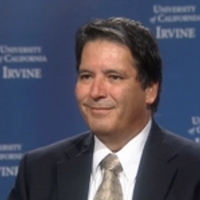Leo Chavez
University of California, Irvine, Anthropology, Faculty Member
We examined the effect of political rhetoric on the targets of that rhetoric. Drawing from scholarship on anti- Mexican and anti-immigrant rhetoric found readily in various media and scholarship on emotions, we tested four hypotheses.... more
We examined the effect of political rhetoric on the targets of that rhetoric. Drawing from scholarship on anti-
Mexican and anti-immigrant rhetoric found readily in various media and scholarship on emotions, we tested four
hypotheses. Hypotheses 1 and 2 predicted that positive and negative political rhetoric would increase and decrease
positive and negative emotions, respectively. Hypotheses 3 and 4 then predicted that emotional responses
to positive or negative political rhetoric would influence perceived stress, subjective health, and subjective wellbeing.
Data collection occurred between August 2016 and June 2017 at a university in California. A sample of
280 Mexican-origin youth, defined broadly as having at least one ancestor born in Mexico or the participant
themselves born in Mexico, participated in an experiment where they were randomly assigned to one of three
study conditions: viewing (1) positive or (2) negative political rhetoric about immigrants and Latinos in general,
or (3) neutral rhetoric as a control condition before providing qualitative responses to open-ended questions and
completing measures of positive and negative affect, perceived stress, subjective health, and subjective wellbeing.
Qualitative responses indicated that negative and positive political rhetoric elicited a range of negative
emotions and positive emotions, respectively. Quantitative analysis with independent samples t-tests, ANOVA,
and linear regression models found that negative political rhetoric elicited higher negative affect than positive
and neutral rhetoric, and positive rhetoric elicited higher positive affect than negative and neutral rhetoric.
Negative emotional responses, in turn, were associated with participants’ higher perceived stress, lower subjective
health and lower subjective well-being. Conversely, positive emotional responses were associated with
lower perceived stress, higher subjective health, and higher subjective well-being. Positive political rhetoric, by
eliciting positive emotions, can have a salubrious effect. Altogether, these findings suggest that political rhetoric
matters for the targets of that rhetoric.
Mexican and anti-immigrant rhetoric found readily in various media and scholarship on emotions, we tested four
hypotheses. Hypotheses 1 and 2 predicted that positive and negative political rhetoric would increase and decrease
positive and negative emotions, respectively. Hypotheses 3 and 4 then predicted that emotional responses
to positive or negative political rhetoric would influence perceived stress, subjective health, and subjective wellbeing.
Data collection occurred between August 2016 and June 2017 at a university in California. A sample of
280 Mexican-origin youth, defined broadly as having at least one ancestor born in Mexico or the participant
themselves born in Mexico, participated in an experiment where they were randomly assigned to one of three
study conditions: viewing (1) positive or (2) negative political rhetoric about immigrants and Latinos in general,
or (3) neutral rhetoric as a control condition before providing qualitative responses to open-ended questions and
completing measures of positive and negative affect, perceived stress, subjective health, and subjective wellbeing.
Qualitative responses indicated that negative and positive political rhetoric elicited a range of negative
emotions and positive emotions, respectively. Quantitative analysis with independent samples t-tests, ANOVA,
and linear regression models found that negative political rhetoric elicited higher negative affect than positive
and neutral rhetoric, and positive rhetoric elicited higher positive affect than negative and neutral rhetoric.
Negative emotional responses, in turn, were associated with participants’ higher perceived stress, lower subjective
health and lower subjective well-being. Conversely, positive emotional responses were associated with
lower perceived stress, higher subjective health, and higher subjective well-being. Positive political rhetoric, by
eliciting positive emotions, can have a salubrious effect. Altogether, these findings suggest that political rhetoric
matters for the targets of that rhetoric.
Research Interests:
Birthright citizenship has a deep and contentious history in the United States, one often hard to square in a country that prides itself on being "a nation of immigrants." Even as the question of citizenship for children of immigrants was... more
Birthright citizenship has a deep and contentious history in the United States, one often hard to square in a country that prides itself on being "a nation of immigrants." Even as the question of citizenship for children of immigrants was seemingly settled by the Fourteenth Amendment, vitriolic debate has continued for well over a century, especially in relation to U.S. race relations. Most recently, a provocative and decidedly more offensive term than birthright citizenship has emerged: "anchor babies."
With this book, Leo R. Chavez explores the question of birthright citizenship, and of citizenship in the United States writ broadly, as he counters the often hyperbolic claims surrounding these so-called anchor babies. Chavez considers how the term is used as a political dog whistle, how changes in the legal definition of citizenship have affected the children of immigrants over time, and, ultimately, how U.S.-born citizens still experience trauma if they live in families with undocumented immigrants. By examining this pejorative term in its political, historical, and social contexts, Chavez calls upon us to exorcise it from public discourse and work toward building a more inclusive nation.
With this book, Leo R. Chavez explores the question of birthright citizenship, and of citizenship in the United States writ broadly, as he counters the often hyperbolic claims surrounding these so-called anchor babies. Chavez considers how the term is used as a political dog whistle, how changes in the legal definition of citizenship have affected the children of immigrants over time, and, ultimately, how U.S.-born citizens still experience trauma if they live in families with undocumented immigrants. By examining this pejorative term in its political, historical, and social contexts, Chavez calls upon us to exorcise it from public discourse and work toward building a more inclusive nation.
